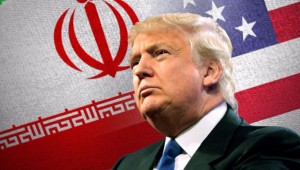
President Donald Trump’s decision to pull out of the deal with Iran creates, unnecessarily, a new source of tension in a region besieged by conflicts. This move was heartily supported by Israel’s Prime Minister Benjamin Netanyahu, and opposed by all other governments that are part of the deal. Given the level of legal troubles that President Trump is facing now, his decision could be based to some extent in creating the conditions to fog his personal drama.
For several decades, relations between the U.S. and Iran and between Iran and the West have been shrouded in misconceptions and prejudices. They have done nothing to achieve a peaceful relationship with that country, and only led to a permanent state of distrust that can lead to war at any moment. In this situation, some basic facts need to be restated.
The present conflicting relations can be traced to a large extent to 19 August 1953, when both the United Kingdom and the US orchestrated a coup that overthrew Iran’s democratically elected Prime Minister, Mohammad Mossadegh. The reason: Mossadegh was trying to audit the books of the Anglo-Iranian Oil Company (AIOC), a British corporation, to change the terms of that company’s access to Iranian oil.
Following the refusal of AIOC to cooperate with the Iranian government, the Iranian parliament voted almost unanimously to nationalize AIOC and expel its representatives from Iran. The anti-government coup that ensued led to the formation of a military government under General Fazlollah Zahedi. That government then allowed Mohammad Reza Pahlavi to rule the country as an absolute and ruthless monarch.
60 years after the coup, the American Central Intelligence Agency (CIA) finally admitted that it had been involved in both its planning and the execution of the coup that caused 300 to 800, mostly civilian, casualties. That fateful coup and the US behavior towards Arab governments throughout the region are behind the anti-American sentiment not only in Iran but throughout the Middle East.
I wonder how we, in the United States, would have reacted if China and Russia, for example, would have plotted to overthrow a democratic American government, leaving a chaotic situation in its wake. In addition, while Iran has not invaded another country in centuries, both the US and Israel, Iran’s enemies, have led brutal wars against other countries and peoples.
US interference in Iranian affairs didn’t end there. In September 1980, Saddam Hussein started a war against Iran that had devastating consequences for both countries. The war was characterized by Iraq’s indiscriminate ballistic-missile attacks and extensive use of chemical weapons.
The war resulted in at least half a million and probably twice as many troops killed on both sides, and in at least half a million men who became permanently disabled. The US actively supported Saddam Hussein in his war efforts with billions of dollars in credits, advanced technology, weaponry, military intelligence, and Special Operations training.
Pentagon officials in Baghdad planned day-by-day bombing strikes for the Iraqi Air Force. According to the US former ambassador Peter W. Galbraith, Iraq used this data to target Iranian positions with chemical weapons. Despite the brutality of these attacks, Iran didn’t respond in kind.
In 1984, Iran presented a draft resolution to the United Nations Security Council condemning Saddam Hussein’s use of chemical weapons, based on the Geneva Protocol of 1925. The US instructed its delegate at the UN to lobby friendly representatives to support a motion to abstain on the vote on the use of chemical weapons by Iraq. Given these facts, can we be surprised that Iranians have a deep resentment against the US?
However, rather than following a policy of appeasement, President Donald Trump nixed the agreement with Iran that goes contrary to the US’s own political and economic interests in the region. And they have a faithful ally in Israel’s Prime Minister Netanyahu.
Where do these actions lead us to?
*
Dr. Cesar Chelala is a winner of an Overseas Press Club of America award and a national journalism award from Argentina. He has written extensively on Iranian issues.
The original source of this article is Antiwar.com
Copyright © Dr. Cesar Chelala, Antiwar.com, 2018













